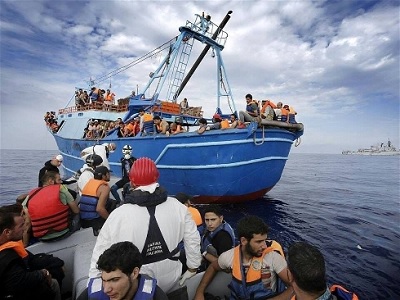
By Joe Dyke – Beirut
Of the two, Jad never wanted to leave – Syria was home, and he liked it. His friend Hassan* had been angling for a move to Europe for years, hoping to further his studies. Then war came.
More than four years since the start of the country’s bloody civil war, the two childhood friends have now fled their homes in the Yarmouk Palestinian camp on the outskirts of the capital Damascus. Both left looking for better – and safer – futures, but that’s where their paths diverged.
After several years of trying through legal channels, Jad, 25, gave up and boarded a smuggler’s boat to Italy. He ultimately made it to Denmark. Hassan tried and failed to make it to Europe legally. He remains in Turkey, where he is considering following in Jad’s footsteps.
So far this year, more than 100,000 migrants have arrived in southern Europe by boat. Another 1,800 did not survive the journey. Up to 30,000 are predicted to drown off of Europe’s coast this year.
Faced with such daunting odds, what advice would one friend who has travelled the treacherous route give to another considering it?
A Risk Worth Taking?
Jad’s journey to Europe was far from direct. After fleeing Syria, he bounced around the Arab world looking for sanctuary: Algeria, Lebanon, Libya – in each he found the doors either closed to him or barely open.
The Arab world, he said, had deserted him. “In Europe, countries are progressive towards refugees, unlike in Lebanon and other places where racism and humiliation [are common].”
Part of this is about scale – the Arab world has taken in millions of Syrian refugees while Europe’s doors have remained largely closed.
Eventually he travelled to the southern Turkish port town of Mersin where he joined thousands of migrants and refugees waiting to board smugglers’ boats to Italy.
“The smuggler told me the boat was big, with life jackets for all and plenty of food and drink. The reality was very different.
“It was a fishing boat and there were no life jackets. There were so many people that there was no space at all.”
Three days into the journey, their Egyptian smugglers transferred them onto a second boat.
“When the waves hit us, the ship’s engines would stop working and we thought we would die any minute.”
They spent another eight days at sea before eventually reaching Italy’s shores.
“The smuggling boats are a big risk. We had two [possible outcomes] only: either to live a decent life or die in the sea.”
From Italy, he managed to smuggle himself across Europe to Denmark, where he claimed asylum. Life now, he says, is “beautiful”: “I can walk down the street like anyone else.”
Left Behind
Hassan lives on the outskirts of Turkey’s largest city, Istanbul. He is surviving, but – like Jad – wants more than Turkey has to offer.
“I have been here for 11 months and I really like it here and I could stay for longer. But Turkey doesn’t give citizenship or the same asylum rights as Europe does. They give us a temporary residency, which is the same as my family had in Syria for 60 years [as Palestinians]. I don’t want to be stateless for the rest of my life.”
Before the war in Syria, he was admitted to a British university, but didn’t have the money to take up the offer. He recently tried applying for asylum through the French embassy but has heard nothing about his case for months.
“It [the boats] was always a choice, but one we didn’t want to do. Now the weather is better. People are getting to Greece. My brother-in-law made it. He is in Macedonia.”
What is he doing there? “He is in prison [due to illegal entry]. Maybe that’s not such a good example!” Hassan laughs.
But he has already mapped out the journey and knows how to get hold of smugglers.
The route from Mersin, he says, is now far harder. So he would prefer to travel from the port city of Izmir. “From there you make your way out; you buy a fake ID; and try to convince the airport officers you are European. My sister’s name [on her fake passport] was Victoria. She is in Germany. My mum is in Germany as well.”
“I am worried about drowning, but you get to a stage where it no longer matters.”
Asked what advice he would give to his old friend Hassan, Jad says: “I would not advise any friend, relative or even an enemy to take the sea route, but Syrians have no option or a place of refuge.
“Travel to Europe is the way to the life they dream to lead. Syrians are aware of the deaths and the boat sinking incidents that are happening in the sea, but they will continue migrating as long as the situation in Syria persists.”
* Hassan’s name has been changed to protect his identity
(IRIN – www.irinnews.org)





Help @ShiptoGazaSE & #FreedomFlotilla3 to reach #Gaza & break the Israeli #blockade! DONATE https://shiptogaza.se/en/donate